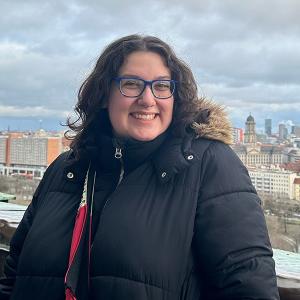It's been almost a year in the making, took a great deal of time, energy, and paperwork, and probably made more than a few staff members resent seeing my e-mails pop up in their inboxes, but this past week my independent major in the Conservatory was approved. I'm impossibly excited about this new program, which I've entitled "Contemporary Improvisation," and I think that the way Oberlin goes about setting up independent majors is highly sensible and fair, if at times also labor-intensive. The latter is perhaps a necessary side effect of the former.
The program itself is an attempt to reconcile my interests with the available resources in the Conservatory. I'm currently a jazz major, and so at first I raised some eyebrows when I mentioned my idea for a major in contemporary improvisation, since jazz is both a contemporary musical form and also heavily improvisatory. But I see jazz as coming out of a very specific musical heritage--the gradual synthesis in America of West African folk and European concert music during the 18th and 19th centuries culminating in the rise of blues and swing music in the early 1900's, and then the addition of Cuban and Brazilian music in the middle part of the 20th century. In my mind, jazz music is any music rooted in that specific lineage. The problem is that starting in the 1960's jazz began to move away from this mold; John Coltrane infused elements of Indian classical music into his playing, Miles Davis went electric, Ornette Coleman went all over the place. Elements of that early jazz heritage were still present, but they were less obvious, obfuscated or overshadowed by the imposition of new sounds, forms, and techniques.
Today, the jazz page on Amazon.com lists Wynton Marsalis, a jazz classicist and conservative on a mission to recreate jazz music from days past, right alongside Peter Brotzmann, an Eastern European avant-garde reed player with maniacal musical sensibilities. Performers of modern improvised music have blurred all the genre lines--drummer Jim Black's music more closely resembles rock and metal than it does jazz, and John Hollenbeck's harmonic ideas stem more from Morton Feldman than Duke Ellington.
This is why a major in contemporary improvisation, distinct from jazz, seems so necessary to me: the demands placed on the performer of modern improvised music are immense, requiring fluency not only in the jazz idiom but also in electronic and electro-acoustic music, world music (particularly the classical music of North and South India, the Middle-East, Cuba, and Africa), and contemporary European classical music of both determinate and indeterminate structure. The resources to explore these disparate areas all exist here at Oberlin, but last winter, as I found myself mapping out most of my courses for my time at Oberlin (a recommended activity for double-degree students), it became clear that I wouldn't be able to take advantage of these resources under the constraints of the jazz major (which, curiously, has more pre-requisites than any other major in the conservatory except for voice performance) and my politics degree.
The coursework that I will now pursue touches on ethnomusicology, contemporary European and American classical music, jazz, and electronic music. I'll be taking drum lessons with Jamey Haddad, world-renowned for his knowledge of Middle-Eastern and Indian music, and also an incredibly nice guy. I'll be taking TIMARA (Oberlin's music technology department) lessons, in which I'm hoping to delve deeper into Ableton Live (a program which I've been using at a very amateur level for a little while now) and also learn Max/MSP, a programming language that allows you to design custom music-making programs. I'll still be working with my current teacher, Billy Hart, and participating in small jazz ensembles. I'll be taking a New Music Workshop with the composition department, a class on Balkan music, a music history class on music since 1914, and so on and so on and so on.
I could (and to some extent already have) talk about the major itself for quite a while, but I think the process by which it got approved is also worth discussing. Oberlin's requirements for forming an independent major are somewhat stringent, but as a result there are a great deal of invaluable resources available for getting through the application process. My adviser, Dean Alegant, is also the chair of the independent major committee, and she and I met about twice a month this semester to hone my application and my course map. I also met with faculty from the composition and TIMARA department, who went out of their way to guide my coursework and make sure I wasn't wasting my time on something irrelevant. In addition to simply being long, the application is also difficult in that you must still satisfy certain requirements in order to graduate--a certain number of semesters of primary lessons, music theory and ear training requirements, etc. I will admit that I initially found some of these frustrating, but the diversity of coursework available meant that I was able to reconcile my major with these requirements, and I now think that without those in place the major I would have come up with would not have been as substantive.
So here I am, entering my last two weeks as a jazz major, about to be given the opportunity to study the music that really interests me at one of the best music schools in the country. It remains to be seen how I manage to use what I learn from my courses in a musical setting (I've been given just enough rope to hang myself, as they say); suffice to say that it will be a topic I'll explore often here. If you have any questions about the I.M. process, or music in general, feel free to ask.


